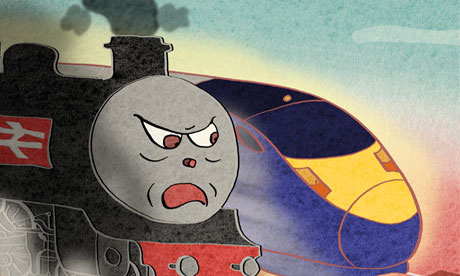Nicholas Hogg in Cricinfo
We are built to cheat. Our DNA demands that we take the opportunities that increase our chance of survival. In Stanley Kubrick's adaptation of Arthur C Clarke's 2001: A Space Odyssey, it is the bone-wielding apes who viciously club the unarmed apes. No lingering guilt about what is fair inhibits their bloody victory. But these are primates fighting over territory in a tooth-and-claw scrabble without values to impinge their survival instincts, distant cousins of refined cricketers imbued with a sense of moral duty to a sport that has long been elevated above other recreation as a bastion of fair play.
------
Also Read
On Walking - Advice for a Fifteen Year Old
-----
However, it is the codified rules, empirical rather than moral, that ultimately define a sport. In football you cannot touch the ball with your hands, in rugby football you can. Bereft of guidelines a sporting contest debases back to the savannah. Medieval, unruly versions of the beautiful game involved neighbouring villages fighting to move a ball from one field to another. These riotous matches, with surging mobs hacking, wrestling and lurching back and forth across muddied fields - much like a Five Nations clash from the 1980s - were banned in 1314 by an Edward II Royal Decree that declared "hustling over large balls" as an act "from which many evils may arrive."
Cricket, conversely, has often been taught in an effort to instil morality and sportsmanship. The phrase "It's just not cricket" has been popularised to describe underhand behaviour in wider society. The MCC, the owner of the Laws of Cricket since the 18th century, included a Preamble on this "Spirit of Cricket" in its updated 2000 code: "Cricket is a game that owes much of its unique appeal to the fact that it should be played not only within its Laws but also within the Spirit of the Game. Any action which is seen to abuse this Spirit causes injury to the game itself."
Occasionally players do contravene this near-mystical ethic of cricketing spirit. In 1981, six runs were needed from the last ball of the third World Series Cup final between Australia and New Zealand, and Australian captain Greg Chappell instructed his brother Trevor to bowl underarm. New Zealand's No. 10 Brian McKechnie blocked the grubber and then hurled his bat away in disgust. Outrage followed, and the Australian Cricket Board acknowledged that Chappell's action "was within the laws of the game" but as the MCC would formally state, "that it was totally contrary to the spirit in which cricket has been, and should be, played".
The unwritten code of fair play had been broken, and a week later the law was changed to ban underarm bowling. Like religion, the Spirit of Cricket is a concept universally understood but not universally practised.
In the first Ashes Test at Trent bridge, Stuart Broad edged Ashton Agar to first slip and stood his ground when he knew full well he was out. Sensing that he might escape justice, his face was that of a boy wiping away the crumbs of a stolen cookie - never has he looked more like the nefarious Malfoy from Harry Potter than when he realised his stay of execution.
It is the same player, whether on the village green or Test match arena, stuttering "I really wasn't sure if I'd hit it" who demonstrates an ancient skill - not only to others but also to oneself.
"In a competition for mates, a well-developed capacity for self-deception is an advantage," writes philosopher John Gray in Straw Dogs. "The same is true in politics, and many other contexts."
Including, one would argue, when at the crease.
"If they believe the lie," says Victor Gombos, a psychologist at California State University, "it's easier to be convincing." That golden duck turned into a century is sweeter still if the guilty man can free himself of the crime.
The walk-or-not-to-walk conundrum is a direct test of moral fortitude against genetics - a measure of character extended to home umpires in club games when they, as well as the appealing fielders, are well aware that the ball held aloft in the keeper's glove did indeed feather their team-mate's bat - and a prime example of how lying, whether to oneself or to others, is a pre-programmed ability.
Cheating will advance too. Silicone tape and Murray Mints. Sunscreen made of beeswax. Each mutation of advantage will result in a tweak of governance
"Almost all children lie," notes the director of the Institute of Child Study at Toronto University, Dr Kang Lee. In 2010, after studying 1200 children Lee claimed that lying "is a sign they have reached a new developmental milestone" and evidence of a fast-developing brain. He was quick to negate the link between juvenile deception and graduation into adult fraudsters - and, we presume, dishonest cricketers.
Whether Broad not walking constitutes a lie is debatable. No one asked him if he had hit the ball. And, as many great batsmen have done before him, he is entitled to wait on the umpire's decision. But a cheat? If so, he is certainly not the first, or the last.
In a 2013 survey conducted for the MCC and the Cricket Foundation, one in 20 children questioned admitted they were proud to have achieved victory dishonestly. With 22 players involved in a cricket match, that correlates to at least one dedicated cheater per game. This will to sporting power, to win at all costs, was highlighted in Dr Robert Goldman's 1984 survey that claimed over 50% of athletes would take an undetectable drug that assured them five years of glory.
Darwinism teaches that a quest for truth is often contrary to our survival. The truth is that Broad edged the ball to first slip, and the deception prolonged his life. Here, the "victory" gene, as I shall briefly rename Dawkins "selfish" original, is in conflict with what is considered fair play. Morality is built on the shifting sands of time, place and culture, and in natural selection the human mind pursues evolutionary success, not values.
Therefore as we evolve, the rules, and how they are applied, must adapt too. Sporting laws that fail to keep players in check will die off like dodos. Cricket changes because we are inventive mammals with the capacity for creativity - cheating.
The DRS will improve. Hot Spot and Snicko will see and hear with Orwellian focus. The Ministry of Truth will reign over every high-definition microsecond of every televised game, and on-field umpires - such as Tony Hill on the third morning at Chester-le-Street, when the big-screen replays confirmed his error and the players were halfway off the pitch before he raised his finger to an empty wicket - will be no more than conduits for decisions made by circuit boards.
And cheating will advance too. Silicone tape and Murray Mints. Sunscreen made of beeswax. Each mutation of advantage will result in a tweak of governance. While the coming youth play warped forms of our beloved game, and we casually forget this is a sport born on grassy meadows with curving bats and gates of sticks instead of stumps - an evolving game - our fading generation will hark back to a time when cricket was cricket, and a batsman could stand his ground whether he had hit the ball or not.






